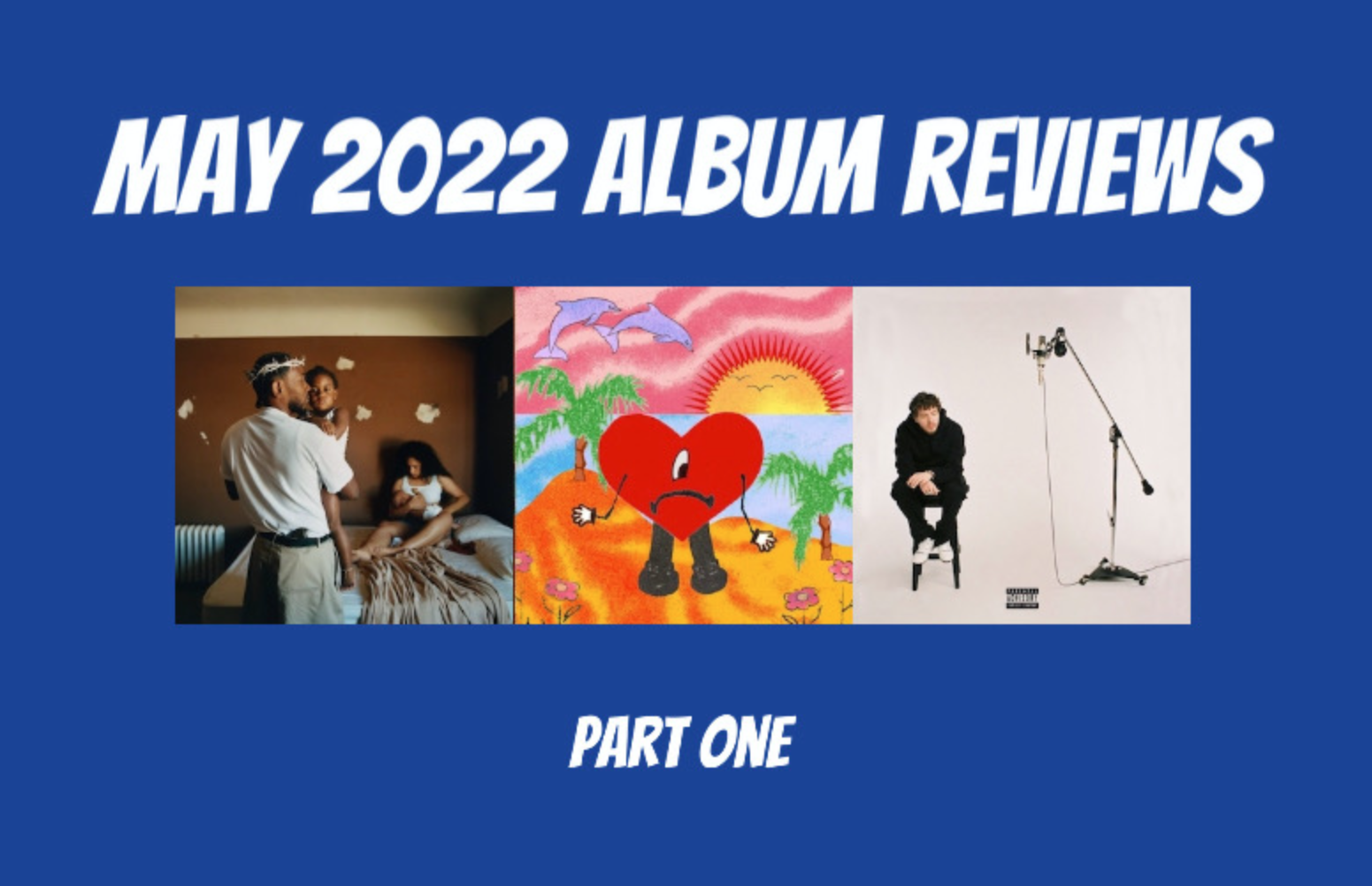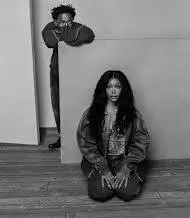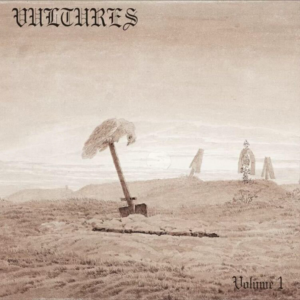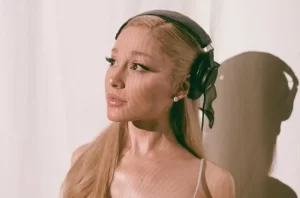by Anton Dedvukaj
The month of May was a very interesting month for the music scene. With a combination of industry veterans making their grand return and newcomers making their big plays for the mainstream, May was a packed month for album releases. The first half of the month, like April, was very rap-heavy, but very interesting nonetheless.
This month, I listened to five albums, three of which I will be covering in this part of the review. These albums are Kendrick Lamar’s Mr. Morale & The Big Steppers, Bad Bunny’s Un Verano Sin Ti, and Jack Harlow’s Come Home The Kids Miss You. The other two albums will be covered in the late May album reviews segment, which is coming soon.
Kendrick Lamar – Mr. Morale & The Big Steppers
Out of all of the releases so far this year, this album was far and away the one that I was anticipating the most. The reasoning for this is simple, as Kendrick Lamar is my favorite rapper, and this is his first full album since the release of DAMN. in 2017. The reason why Lamar is my favorite rapper is also quite simple. I’ve always admired his technical skill as a rapper, his intricate ability to tell compelling stories in his work, and his ability to do so in an accessible package that still allows for enjoyable pieces of music to be made.
To say that I had high expectations for this project would be an understatement. After Lamar came back from hiatus to feature on Baby Keem’s “family ties”, it was apparent to me that he was all set to release a great album. The non-album single released shortly before this album, “The Heart Part 5”, further confirmed this, as it also proved to be a great song. Now that I’ve heard the album in full, I can say that my expectations were met.
To start, the production on this album is fantastic. There isn’t a single track here that I thought sounded bad. The beats all perfectly accomplished the mood that they were trying to set, whether that be a more conventional pop rap song, like on “Die Hard”, or to serve as a backdrop for a story, like on “Purple Hearts” or “Mother I Sober”.
This leads nicely into my next point about this album, in that the lyricism was also on point. For example, “Father Time” details Lamar’s self-described “daddy issues” and the impact that they left on him, “We Cry Together” paints an interesting picture of an ugly dispute between a couple, with Taylour Paige playing the other side really effectively, and “Purple Hearts” has Lamar rap about a search for truth, Summer Walker sing about love, and Ghostface Killah deliver a hard-hitting and deeply spiritual closing verse. Keep in mind, this is only the first half of the album!
While the album’s first half is definitely more accessible sonically, the second half takes more chances lyrically. In particular, the song on the album that I felt was the most emotionally charged lyrically was “Mother I Sober”. The song goes into a deep dive on some of the traumas that Lamar witnessed throughout his life, such as murder, addiction, systemic racism, and sexual assault. The song takes a lot of really difficult topics and places them all within a nearly seven-minute song where Lamar details his own experiences with these topics in such a captivating way. Even if this isn’t a song that I see myself returning to all that often, I respect it a lot.
Another song that took a chance lyrically was “Auntie Diaries”, which has found itself to be quite controversial recently. The song is written about Lamar’s experiences with two transgender family members, and he tackles his own past and present beliefs about homophobia and transphobia within the song. That being said, he does also misgender both family members a few times and use a homophobic slur, which caused some significant controversy following the album’s release.
The album as a whole has an interesting concept behind it, in that it’s structured like a therapy session for Lamar. He goes in depth about a lot of the aforementioned issues, specifically in how they affected him throughout his life. It makes the album a fair bit heavier, sure, but it also makes it all the more interesting and fascinating.
Lamar himself is also on point here as a performer. He flows over these beats so well, and when combined with his impressive lyricism, he makes the songs so much more engaging. The features also delivered here. For example, I want to highlight Blxst’s really smooth hook on “Die Hard”, which is probably my favorite song on the album for its tight, West Coast-inspired groove. I also loved Summer Walker and Ghostface Killah’s aforementioned contributions, Sampha’s hook on “Father Time”, and Baby Keem’s contributions to “Savior”, which were three other favorites of mine on this album.
This album is now the frontrunner for my favorite album of 2022 thus far. It’s rare for an album to run over an hour and yet for all of the tracks to all feel as distinct and well-crafted as they are here. My favorites on the album are definitely subject to change, and I’m picking them based solely on which ones I think I’ll find myself returning to the most often. That being said, between the high amount of replayable tracks and the amount of more lyrics-focused tracks that tackle a lot of interesting topics in a lot of interesting ways, I’d highly recommend this album to anyone reading, even if you’re not that into rap. This album was great, and definitely one I’d recommend listening to.
Best songs: Die Hard (with Blxst & Amanda Reifer), Purple Hearts (with Summer Walker & Ghostface Killah), Father Time (feat. Sampha)
Bad Bunny – Un Verano Sin Ti
Before I get into reviewing this album properly, I want to address the elephant in the room first. Yes, I know that I am way out of my depth here. I’m a native English speaker who chose to take French over Spanish, and I speak little to no Spanish at all. In essence, this means that any review I give this should be taken with a grain of salt.
That being said, I definitely did want to check this album out. With the massive resurgence of Latin music in the American mainstream that took place after the 2017 dominance of “Despacito”, Bad Bunny has been able to establish himself as a huge name, not just in the Latin market, but in America’s music scene at large. While he initially started off his attempts at crossover through collaborations with the likes of Cardi B and Drake, he’s since been able to score massive success for albums that have little to no English words in them at all, which is insanely impressive. I decided to listen to this to see what all the hype was about, and I’d say it was worth it.
Seeing as I’m only able to judge this album sonically due to the language barrier, I’m going to highlight three things: production, features, and vocals. The production across this album was actually quite solid. Sure, you’ll get plenty of songs with typical standard reggaeton elements, particularly in the percussion, which is a bit of a criticism I have with both this album and a lot of the mainstream music in this genre. However, the key here is that there are a lot of songs that cultivate different vibes.
For example, take a song like “Aguacero”, with its more melancholic elements, which create a very nice, chilled out atmosphere. Now, contrast that with songs like “La Corriente” and “Party”, which are more energetic. The former had a lot of intensity and energy, while the latter was a more relaxed, vibe-focused party song. Then, there are songs like “Neverita” with more traditional pop and trap rhythms and elements. Most songs sounded distinct and different from each other, which helped this album stick in my memory more than it otherwise would have.
Then, you have the features on this album. I’ll admit that I wasn’t familiar with most of the features on this album, given my limited exposure to Latin music. That being said, I think most of the features served their purpose on the album well. In particular, I liked how Tony Dize brought some intensity to “La Corriente” that Bad Bunny was able to match quite well, I enjoyed Rauw Alejandro’s relaxed and catchy melodies on “Party”, and Jhay Cortez lended a solid performance on “Tarot”.
And lastly, there’s Bad Bunny himself. I do generally like his performances on the songs I hear from him, and this album generally kept up that streak of quality. He can be a pretty expressive performer when he wants to be, and that comes through here quite nicely. Despite the fact that I don’t speak the language, I didn’t find it all that hard to understand what kind of tone he was trying to set with most of these songs, be they the more upbeat party songs or the more melancholic ones.
I think that the main reason why this album resonated with me was because it just sounds like the sort of music that you would hear at a beach party. I can see so many of these songs working really well in that setting, and given that we are heading into the summer, I can definitely see myself keeping a few of this album’s tracks in my rotation. Are there some forgettable songs here and there? Sure, that’s a given, especially with an album that runs nearly an hour and a half long. However, even with that, I’d still say that, if what I described sounds interesting to you, you should give this album a shot.
Best songs: “La Corriente” (with Tony Dize), “Party” (with Rauw Alejandro), “Aguacero”
Jack Harlow – Come Home The Kids Miss You
Like many people, I had my eye on Jack Harlow heading into 2022. He first emerged into the mainstream thanks to his massive 2020 viral hit “WHATS POPPIN”, and while that song helped him get some notoriety, I’d argue that it was his featured verse on Lil Nas X’s “INDUSTRY BABY” last year that really helped him blow up to the level that he’s reached now. It’s not hard to see why, seeing as that verse was fantastic and made an already great song even better, but it had me curious about where Harlow’s solo material would go.
He started his 2022 by dropping the lead single from this album, “Nail Tech”, which was a pretty fun horn-infused trap song that gave me high hopes for where he would go next. He followed that up with a number-one single, “First Class”, which combined R&B elements with a prominent sample of Fergie and Ludacris’ “Glamorous” to pretty good results. Seeing as I really liked the album’s two lead singles, I was curious to see if this album would be any good. After listening to it, I’ll say that it was fine.
Honestly, while I’m not going to claim this to be the album of the year or anything, I will say that I found parts I liked on the album and I feel like the massive amount of negative reception that I’ve seen this get was absurdly overblown. It reminded me a lot of Drake’s last album, Certified Lover Boy, in that it had a lot of expectations placed on it, and when the final product ended up being just decent instead of fantastic, people were disappointed. That being said, I was mostly willing to stick up for Drake’s album, and I’m willing to do the same for Harlow.
Let’s rattle off the highlights. I’ve mostly found myself coming back to three songs from this album, in addition to its two singles. The first was “Dua Lipa”, which had some energetic production, a chilled-out performance from Harlow that worked well with it, and a reference to one of my favorite pop artists at the moment.
Then, there was “Churchill Downs”, which features Drake and reminds me a lot of some of my favorite Drake songs, such as 2013’s “Pound Cake”, with how both rappers spend half the song on a stream-of-consciousness verse over a pitched-up vocal sample. It’s not as good as “Pound Cake” was, but that’s a high bar to reach, and “Churchill Downs” did just fine. Finally, there was “Like A Blade of Grass”, which had a low-key energy and catchy hook that worked for me pretty well.
One other thing I liked was the aesthetic that Harlow set out to achieve here. The album is clearly going for a 2000s hip-hop aesthetic, as evidenced by features from Justin Timberlake, Lil Wayne, and Pharrell Williams, the Fergie sample that I previously mentioned, and a lot of Harlow’s calm, cool, and collected attitude on the album. I’m a big fan of this sound, and it’s a big part of the reason why I gravitated towards the singles, particularly “First Class”.
That being said, it’s not like I don’t get some of the criticisms that this album got. Despite the fact that I am a vocal fan of this 2000s era of music that Harlow is clearly paying homage to, I found most of the deep cuts to come in one ear and out the other. I can pretty clearly discern which songs on the album were probably meant to be singles and which ones were “album filler”, with the latter tracks generally being more forgettable than I’d like. While those single-ready tracks – namely “Dua Lipa” and “Churchill Downs” – had a lot of what I expected, liked, and wanted from this album, I’ll probably just take the songs I liked and leave the rest behind.
To be fair, there is still a good amount to like about this album. Harlow’s a charismatic performer, even if he tries a few more corny lines than I’d like, and he’s got good production behind him, with some cool beat switches coming in on a lot of tracks. I definitely think that this album is decent and that there is quality here, even if it’s not as fantastic as so many online clearly thought it would be. For a recommendation, check it out if you’re a fan of this sound, and for everyone else, I’d say check out the highlights, and then decide where to go from there.
Best songs: “First Class”, “Dua Lipa”, “Churchill Downs” (feat. Drake)
While the first half of May was quite rap-heavy, there was a lot of really good music released. It seems that the music scene is really ramping up with new music for 2022, which is only a good thing, in my opinion. The late May album reviews will be coming soon, so stay tuned for that.









Be First to Comment